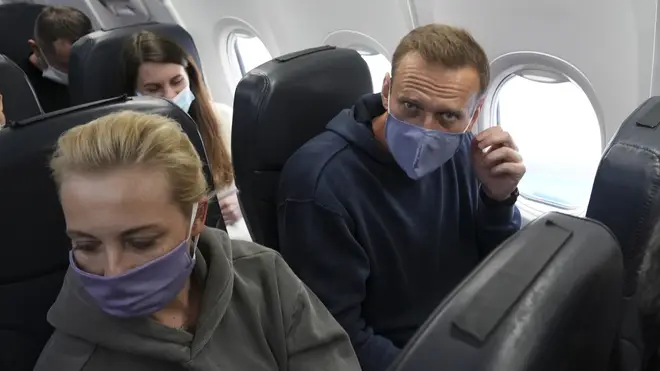
Vanessa Feltz 3pm - 6pm
17 January 2021, 18:16 | Updated: 18 January 2021, 09:33

Britain has called for the immediate release of Russian opposition leader Alexei Navalny who was detained after arriving in Moscow on Sunday night.
The prison service said he was detained for multiple violations of parole and terms of a suspended prison sentence and would be held in custody until a court made a decision in his case.
His flight landed at a different airport to the one scheduled, a possible attempt to outwit journalists and supporters who wanted to witness the return.
President Vladimir Putin’s most prominent foe spent five months in Germany recovering from poisoning by a nerve agent.
A statement from UK Foreign Secretary Dominic Raab said: "t is appalling that Alexey Navalny, the victim of a despicable crime, has been detained by Russian authorities. He must be immediately released.
“Rather than persecuting Mr Navalny Russia should explain how a chemical weapon came to be used on Russian soil."
Mr Navalny announced on Wednesday that he planned to return and said he was "very happy" as he boarded a plane in Berlin bound for Moscow's Vnukovo Airport on Sunday.
On Thursday, Russia's prison service said he faced immediate arrest on his return.
Mr Navalny, who has blamed his poisoning on the Kremlin, said Russian President Vladimir Putin was now trying to deter him from coming home with new legal motions.
The Kremlin has repeatedly denied a role in the opposition leader's poisoning.
Read more: Alexei Navalny released from German hospital after Novichok poisoning
Read more: Alexei Navalny pictured walking down stairs as he recovers from Novichok poisoning

Former CIA chief of Russia speaks to LBC about Alexei Navalny
At the end of December, the Federal Penitentiary Service, or FSIN, warned Mr Navalny that he faced time in prison if he failed to immediately report to its office in line with the terms of a suspended sentence and probation he received for a 2014 conviction on charges of embezzlement and money laundering that he rejected as politically motivated.
The European Court for Human Rights had ruled that his conviction was unlawful.
The FSIN said on Thursday that it had issued an arrest warrant for Mr Navalny after he failed to report to its office.
The prison service, which has asked a Moscow court to turn Mr Navalny's three-and-a-half-year suspended sentence into a real one, said it was "obliged to take all the necessary action to detain Navalny pending the court's ruling".
Vnukovo Airport said last week that it was banning journalists from its terminal, citing epidemiological concerns.

"Russia will lie and lie and lie" - MP on Alexei Navalny poisoning
Many of his supporters were expected to try to gather in the terminal to welcome Mr Navalny, if he was able to get through passport control without being arrested.
Security measures at the airport were heightened on Sunday, with several prisoner-transport vehicles parked outside.
The independent newspaper Novaya Gazeta and opposition social media reported on Sunday that several of Mr Navalny's supporters in St Petersburg had been removed from Moscow-bound trains or been prevented from boarding flights late Saturday and early Sunday, including the co-ordinator of his staff for the region of Russia's second-largest city.

Merkel: Russian poisoning of Navalny is attempted murder
Mr Navalny fell into a coma while aboard a domestic flight from Siberia to Moscow on August 20.
He was transferred from a hospital in Siberia to a Berlin hospital two days later.
Labs in Germany, France and Sweden, and tests by the Organisation for the Prohibition of Chemical Weapons, established that he was exposed to a Soviet-era Novichok nerve agent.
Russian authorities insisted that the doctors who treated Mr Navalny in Siberia before he was airlifted to Germany found no traces of poison and have challenged German officials to provide proof of his poisoning.
They refused to open a fully-fledged criminal inquiry, citing a lack of evidence that Mr Navalny was poisoned.
Last month, Mr Navalny released the recording of a phone call he said he made to a man he described as an alleged member of a group of officers of the Federal Security Service, or FSB, who purportedly poisoned him in August and then tried to cover it up.
The FSB dismissed the recording as fake.